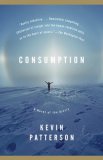Summary | Excerpt | Reading Guide | Reviews | Beyond the Book | Readalikes | Genres & Themes | Author Bio

“Tagak shot a nanuq last week.”
“A good one?”
“Eleven feet.”
“That will get him two thousand dollars, anyway.”
Emo stood there a moment, studying his daughter. If Emo had been the man his own father–in–law was, he would have pushed Robertson off the floe edge and into the sea by now. He turned to the door and opened it.
“Ublukatiarak, attatatiak,” Pauloosie said.
"Igvalu, irnuktuq," Emo answered.
After her father was gone, Victoria cut up a pound of bacon and began frying it. Justine leaned over the kitchen table, opening her math book to do her long division. Marie sat closest to the stove with her Nancy Drew mystery: The Secret of the Old Clock. On the cover, a blond and dauntless Nancy peeked worriedly from behind a tree larger than anyone in the room had ever seen. Pauloosie laid the caribou meat on the counter and began cutting thin strips off it with his hunting knife and stuffing them into his mouth. After a few minutes of this, the bacon was finished and Victoria put a plate of it down in front of the girls.
The wind surged again and rose a half tone in register. Victoria looked out the window at the blowing snow. Pauloosie retreated to his room wordlessly. Her daughters read silently beside her. Storms like this make you appreciate a house. All you had to do was keep from losing your mind.
Chapter Two
When Victoria was ten years old, in the summer of 1962, she was brought on board the government ship C.D. Howe, a red steel supply vessel that traveled along the west coast of Hudson Bay each summer. Her family had noticed how she spent her days squinting into the sky for birds she could hear but not see and peering at stone cairns, Inukshuk, she thought were people. The C.D. Howe conducted tuberculosis screenings and ran a vaccination program together with general minor medical care and eyeglass dispensing. In the late 1950s, the people remained for the most part on the land, coming to the coast in the summer to trade the furs they had accumulated over the winter, and to catch char and arviaat, beluga whales. While they camped there, steel freighters plied the coast, dropping off crates of fox traps and rifle cartridges and flour and tinned meat at the Hudson’s Bay posts, or, in the instance of the government ships, inserting medical appliances into ears and pushing naked chests against X–ray plates and collecting sputa in metal cups.
Emo and Winnie rowed their children, Victoria and Tagak, out to the ship a few minutes after it anchored in the inlet. It was August and there were twelve families camped, waiting for the trading ships. It was getting colder but was not yet cold enough to travel easily on the land. And the rain had come. The walrus hunting was finished until the ice froze again, the deer were far inland, and char were no longer running, so the people were bored and had spent the previous several weeks playing cribbage and arguing. When the government ship appeared, it was greeted as a break in the boredom, and everyone climbed into the boats to visit with the iqswaksayee.
The lab on board the ship processed their sputum samples on the spot and the doctor dispensed antibiotics for the ear infections and provided spectacles to the squinting children. Victoria had wire–framed glasses strapped to her head and gasped at the sudden clarity of the world. All the children were weighed and measured. With the doctor were two nurses who were not nuns but another kind of nurse, whose devotion to their profession was less absolute and more understandable: “nungurayak” was the name for these women, which meant “false nun.” The nurses who spoke enough Inuktitut to understand the etymology of their title were constantly amused by it.
One of these women steered Victoria into a waiting room with her mother and father. Her mother teased Victoria about her glasses, but all she felt was a suffused contentment. Even at a distance, she could see the world now, found it many times as rich and detailed and complex as she had previously understood. One image burned itself into her memory: her father standing in the companionway of the ship in his spring boots, kamiks, and caribou parka, brown and lined in a way that had surprised her. Beside him: her mother, her marriage tattoos almost obscured by her tan, which stopped just where her father's did, at the throat. There, their skin became as pale as a char's belly, and remained so right out to their wrists.
Excerpted from Consumption by Kevin Patterson Copyright © 2007 by Kevin Patterson. Excerpted by permission of Nan A. Talese, a division of Random House, Inc. All rights reserved. No part of this excerpt may be reproduced or reprinted without permission in writing from the publisher.
Flaming enthusiasm, backed up by horse sense and persistence, is the quality that most frequently makes for ...
Click Here to find out who said this, as well as discovering other famous literary quotes!
Your guide toexceptional books
BookBrowse seeks out and recommends the best in contemporary fiction and nonfiction—books that not only engage and entertain but also deepen our understanding of ourselves and the world around us.